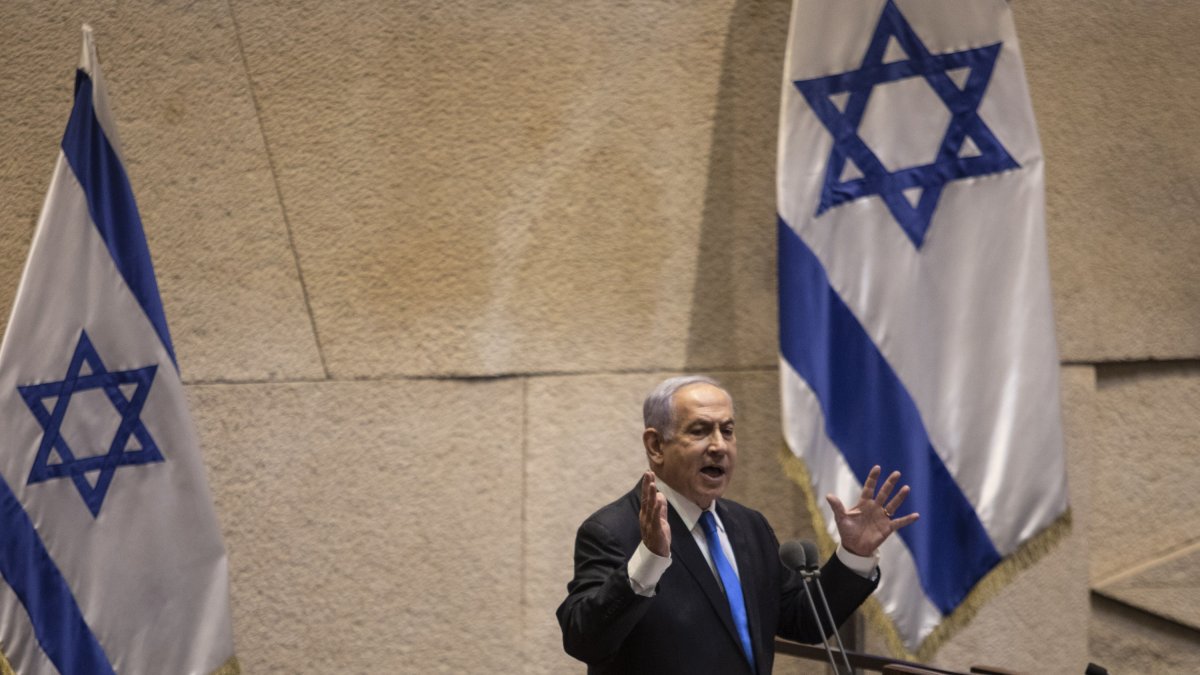The true assault on Israeli democracy
In reality, the end of democracy does not depend on the decision of the government in Jerusalem, but on the attitude of the opponents themselves.

(Benjamin Netanyahu / Cordon Press)
Opponents of the judicial reform proposed by the government of Benjamin Netanyahu have generated an apocalyptic image about "the end of democracy" in Israel if the reform is carried out. But, in reality, the end of democracy does not depend on the decision of the government in Jerusalem, but on the attitude of the opponents themselves who, wanting to delegitimize a conservative and religious government, have sided with a judiciary that for decades has attributed to itself the supreme power to decide not what is legal or not, but what is politically reasonable or not according to their tastes and criteria.
If there is something that Netanyahu can be criticized for, it is not his willingness to reform the system for choosing the judges of the Israeli high court and thus balance the institutional game between the legislative, executive and judicial branches, but rather for not having seen that the Israeli left that hates him, along with international leaders who despise him, such as the current US administration that would like to see him out of power, are willing to break all written and unwritten rules, including calls for violence and desertion, rather than accept his victory and his ability to form the most stable government in recent years.
The proposed reform
The narrative of the Israeli opposition consists, basically, in denouncing the government's proposal because a) it would end the separation of powers; and b) is inspired to save the prime minister from his pending legal cases. But nothing further from reality.
The truth is that, since the end of the 1970s, when the monopoly of the left in power was broken, the magistrates of the Supreme Court, and especially its president Aaron Barak, began to develop a doctrine whereby, in the absence of a constitution (and it must be remembered that Israel does not have a constitutional text but several "basic" laws), it will be the judges who interpret what political and administrative acts conform to the law, according to their own assessment. Moreover, this moral and legal superiority is also granted to the legal advisers to the members of the government, who can refuse to validate police measures approved by the ministers or the government as a whole.
Without a constitutional framework on which to base itself and given the increasing politicization of judges, it could be said that Israeli democracy has been gradually undermined by judges becoming de facto a "juristocracy", a system in which the judges, autonomously, are those who approve or disapprove the laws above the legislative power and, therefore, the popular sovereignty.
The most flagrant case and one that has served as a trigger for the reform was the decision of the Supreme Court to force the dismissal of the new minister of interior and health, leader of the Shas religious party, Arieh Deri, because "it was not reasonable" to hold that position after having reached an agreement with the prosecution years before by which the accusations against him for tax evasion were withdrawn if he resigned from holding any public office. It must be said that the high court did not see any impediment to Deri standing for election and being elected to the national assembly, the Knesset. But the judges did reject that he could serve as a minister, something that was quickly interpreted as opening hostilities against the newly formed coalition government for its conservative accent and religious elements. In other words, no legal reasons but rather political preferences.
The reform proposal focuses on balancing, not dominating, the system of election of magistrates, currently in the hands of a committee where the judiciary has a majority (three members of the supreme court and two members of the judiciary) and the veto capacity of any proposal that, to go ahead, must have 7 of the nine votes of the members of the committee. What the government proposes is that the two members of the judiciary should be appointed by the minister of justice, leaving the other four in the hands of parliament.
Similarly, the reform provides that in the event of a confrontation between parliament and the Supreme Court over a law, it can return to parliament and be approved by a majority even against the criteria of the Court, after a second reading and vote. The government is based on the superiority of the legislature because it is an elective body that represents the popular will.
The fact that judicial reform was a fairly widespread approach before the elections, left, center and right, but became a throwaway weapon only after Netanyahu's victory, highlights the political and non-legal rejection of the government.
Democracy in danger
After weeks of massive demonstrations against the government and in the face of the passivity of supporters of the reform, who have only mobilized in recent days, the prime minister announced at the beginning of this week that he would paralyze the parliamentary process of the reform until the next period of sessions (May) to allow time for a dialogue in the search for a national agreement on the matter.
For his part, the President of Israel, the Labor party Isaac Herzog, had spent weeks preparing a negotiation proposal that also called for the freezing of the new law against the criteria of the minister of justice and the president of Parliament.
Netanyahu's decision is, without a doubt, a gesture for moderation, something that in recent months has completely disappeared from the Israeli political scene, where there are those who already saw a civil war in the offing and which has resulted in such unusual things as two prime ministers, Ehud Barak and Ehud Olmert, both fierce personal enemies of Netanyahu, calling for civil disobedience, violent resistance and the rejection of any compromise or some army reservists expressing their intention not to go to their posts in an open and flagrant insubordination, right in a country where friends are scarce and enemies abound.
There can be no doubt that Netanyahu has given ample proof in the past of being a political master, but it would be naive to think that the opposition is not going to take the paralysis of the parliamentary reform process as a victory over the government. After all, Netanyahu himself had fired a day before announcing postponing the passing of the new law his defense minister for proposing exactly that, postponing its approval in the interest of forging a national consensus.
What's more, if the opposition was not so concerned about the independence of the judiciary, which it has always controlled, but about the delegitimization of the new government, it seems unlikely that this pause will calm their spirits. Perhaps by stripping them of their alibi and exposing that what they are really after is the overthrow of the Conservative government, many of the protesters who have taken to the streets really believing that it was the end of the separation of powers, will now abandon those who have been promoting the resistance to Netanyahu. But it is a risky bet.
In any case, if democracy is condensed in the elections, popular sovereignty represented in parliament and a government that comes from a parliamentary majority, the street has taken all this ahead in a soft blow based on shouting, harassment, and disobedience.
Israel's security
Polarization is never good. And even less so for a small nation surrounded by enemies, some of whom, like Iran, do not rest in their ambition to wipe Israel off the map.
The current division of Israel, fed from the left and willingly supported by the Biden administration, can only be interpreted as a sign of weakness by its enemies. In the case of Iran, the ayatollahs could not be happier than with a government that did not include Bibi Netanyahu, who they know would be capable of ordering an attack against its nuclear facilities. We cannot forget that during 2021 and 2022 Iran significantly accelerated all elements of its atomic program, because they feared neither Biden in the White House nor Lapid in Jerusalem. This is a fact confirmed by the International Atomic Energy Agency.
And this is perhaps the most serious isue: the anti-Bibi front has shown itself willing to risk the security of their country if they managed to make Netanyahu fail as head of government. They have also not given a damn about instilling panic among foreign investors, so necessary for the Israeli economy. For them, everything goes if it adds to the pressure on Netanyahu.
If Israel is finally left at the mercy of high-ranking magistrates and protesters, it is not that the proper functioning of Israel's deeply democratic institutions has been broken, but that hatred of Israel will have been fueled, whoever is in government. Her enemies not only lie in wait, but they will know how to exploit any weakness to their advantage. Feeding the lie that judicial reform is the end of democracy, for example, will prompt all kinds of lawsuits in the International Criminal Court, until now avoided because the Israeli judicial system had all the democratic guarantees in place. When the greatest is denied, everything else falls under its weight. But that, the anti-Bibi seems to care little.
It is not judicial reform that is at stake. Is much more. The legitimacy, well-being and security of all Israelis. And that is what the critics of the reform are really endangering not because they are critical, but because of the way they behave and their repeated refusal to seek compromise.
Let´s hope this pause will bring back the rationality so badly needed, especially in Israel.
























